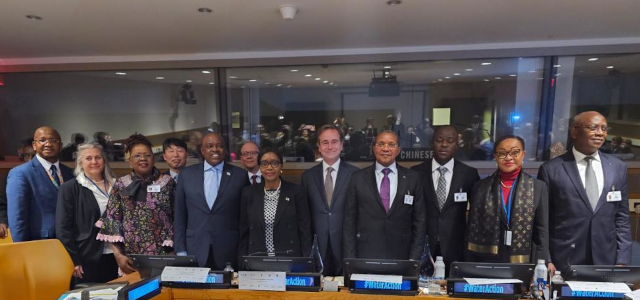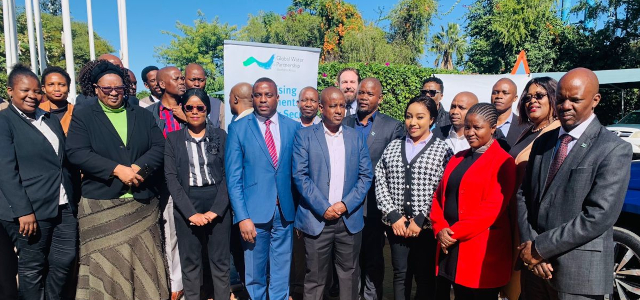Addressing his African peers as well as global developmental leaders, the President of Botswana said that his government supports the objective of the AIP of transforming the outlook for water investments in Africa, which currently stands below target to achieve 2030 SDG 6.
“Being part of the AIP is a great honour for Botswana,” said H.E. Masisi.
The President of Botswana was speaking at the launch of the High-level Panel on Water Investments in Africa’s landmark report, Africa’s Rising Investment Tide, which outlined three pathways to secure an additional USD 30 billion annually to achieve water security and sustainable sanitation in Africa by 2030 on the continent:
- Pathway 1: Achieve more impactful water spending and financial leveraging
- Pathway 2: Mobilise Domestic Resources
- Pathway 3: Secure Global and Continental Investment and Finance

H.E. Mokgweetsi Masisi, President of Botswana (4th from left) & H.E. Jakaya Kikwete, Alternante Co-Chair High-Level Panel, GWPSA-Africa Board Chair, Former President of Tanzania (4th from right) during the launch of the High-level Panel on Water Investments Report at the UN 2023 Water Conference in New York
A kick off meeting for the development of the Botswana Water Investment Programme was hosted on 22 May in Gaborone by the Ministry of Lands & Water Affairs through the Department of Water & Sanitation in Botswana and Global Water Partnership Southern Africa (GWPSA). Stakeholders attending the workshop were apprised on the road map for the development of the Programme and were given the opportunity to provide feedback.
Dr. Kekgonne Baipoledi, Permanent Secretary in the Ministry of Lands & Water Affairs, said the Programme would help Botswana attain water security for its people. He said the development and implementation of the AIP required strong in-country commitment as well as strong stakeholder involvement and mobilisation of partnerships, hence the kick-off meeting.
“The key envisaged result from the development and implementation of the Programme, is mobilisation and leveraging of at least USD 10.8 billion (BWP 146 billion) for climate resilient water investments; and including the water, energy, food, ecosystem, and health nexus. It will also enhance job creation through gender-sensitive investments in water security projects,” explained Dr. Baipoledi.
Dr. Kobamelo Dikgola, Deputy Director of Water & Sanitation said data clearly shows that water supply will continue to be in a deficit especially as demand continues to grow in Botswana. This she said, shows the need for the country to plan accordingly if it is to achieve water security.
Mr. Alex Simalabwi, Director-AIP, and Executive Secretary, GWPSA-Africa, presented on how Botswana can benefit from the recommendations of the International High-Level Panel on Water Investments for Africa report as it begins to develop its country AIP, which he said would facilitate the transformation and improvement on the investment outlook for water security in the country.
To mobilise at least additional USD 30 billion a year, the High-Level Panel proposes a 5-point Action Plan for Heads of State and governments, business and global leaders, to support the implementation of the three actionable pathways:
1. Establish cross-sectoral political leadership at the highest level, with commitment to substantially increase public budgets and investments for water security and sustainable sanitation. Water affects all economic and social sectors. Cross-sectoral leadership is critical. Make increased water security and sustainable sanitation a national and continental priority.
2. Track progress and enhance mutual accountability for results in the mobilisation of water investments and in peer review mechanisms at continental, regional, national, sub-national, and community levels. Recommit to allocation of at least 5% of national budgets for the water and sanitation sector and 0.5% of GDP per annum for sanitation and hygiene programmes.
3. Mobilise new sources of funding and innovative finance, such as institutional investors. Actively support matchmaking platforms to bring together the supply and demand for finance with a special focus on climate resilient, blended public-private finance, and gender transformative approaches.
4. Strengthen institutional regulation for water investments, create incentives and penalties for increased water efficiency across multiple industries to lead water stewardship efforts, biodiversity, and ecosystem protection.
5. Use ODA to de-risk water investments and leverage larger funding streams. Improve implementation capacity and quality of bankable projects and strengthen international cooperation by aligning technical and financial support with regional, transboundary, and national water investment programmes, strategies, and plans.
